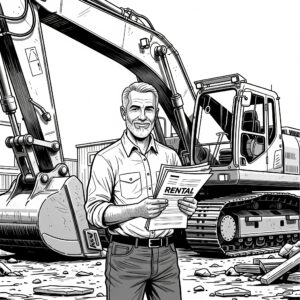How Common is Heavy Equipment Fire Damage?
Unfortunately, fire damage is one of the most dangerous hazards to heavy equipment. While this type of damage is most prevalent in land clearing projects, it should be a continual concern whenever handling large machinery. Other factors such as electrical malfunctions, debris, and combustible fluids are all potential causes of equipment fires.
According to a 2009 issue of Timber West, fire causes 68% of logging equipment losses. Again, not everyone who operates machinery or rents out heavy equipment faces the same type of risk. But focusing on fire prevention concerning heavy equipment is crucial considering the potentially devastating results.
Common Causes of Equipment Fires + Preventative Measures
– Proximity to an Active Burn
While this may seem obvious, it’s all too common. If you’ve never had a fire claim, it could be easy to think, “Well, it would never happen to me.” Well, those are famous last words. Consider creating a standard procedure for your customers or employees about handling machinery when active fires are in the area.
– Poor Operating Environment
How someone operates equipment should be dependent upon the environment. Obviously, circumstances such as rain, mud, cliffs, trees, etc., must be monitored. However, it’s crucial to observe the yearly seasons closely as well. Make sure you know and train any equipment operators to the dangers of your area’s dry season. As your state’s dry season approaches, try sending out a reminder to your customers or employees about fire dangers and preventions.
– Lack of Safety Features
While not all fires can be prevented, many of them can be handled quickly, saving the equipment from costly repairs. Consider outfitting your rental equipment with a functioning fire extinguisher as an added line of defense. Saving a life is always more important than preventing damage to the equipment, but simply having a fire extinguisher on hand can reduce a total loss to repairable damage.
– Lack of Maintenance
Faulty electrical wires can turn dangerous fast. When faulty wires malfunction, they can start anything on fire within their proximity. Therefore, things like small oil leaks that are typically harmless can cause extensive damage to your equipment. Ensure that you or your mechanics are consistently checking the electrical systems for any frayed or broken wires.
Along with electrical dangers, any flammable fluids can cause fires. Again, small oil and gas leaks are not just minor issues. They can lead to the total loss of your equipment. It is much better to take the time and repair the “small” things on the equipment instead of simply ignoring the problem and working through it.
– Debris and Foreign Objects
We cannot stress enough the importance of keeping your heavy equipment free from debris and foreign objects. We have seen that this is the number one cause of equipment fires, and sadly many of them could have been avoided. Before anyone starts the machine, complete a thorough check of all areas where debris could be lodged (pay close attention to areas where heat is generated.)
6 Tips to Remember
“An ounce of prevention is worth a pound of cure.” – Benjamin Franklin
- Stay aware of your surroundings.
- Know the environmental conditions in which you are operating.
- Complete regular maintenance of the equipment (electrical and fluid checks).
- Always check for debris and foreign objects before starting the machine.
- Educate your renters, employees, and other operators of the dangers and preventative measures of equipment fires.
- Stay safe!




